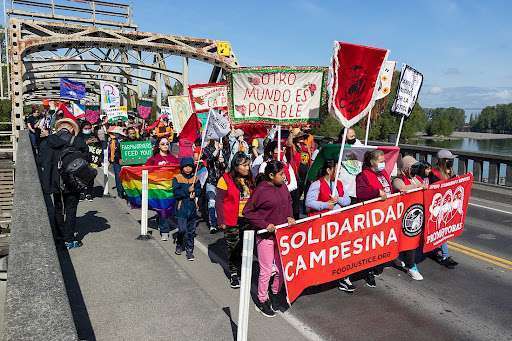PHOTO: DAVID BACON
On Sunday, May 1, Familias Unidas por La Justicia and Community to Community, along with many allies, revived a Skagit County tradition that has been happening since the 1980s. The annual Marcha Campesina, to commemorate International Workers’ Day (May Day) has been missed in recent years due to pandemic protocols and safety concerns. This year, as people started to feel safe and comfortable to re-engage in public events, social functions and mass political protest, march organizers felt it important to revive this mass action to address a number of emergent realities that should be important for all of us to respond to.
Urgency of these times
First, many of the demands that Haymarket protesters rallied for back in 1886 have not really gone away. Certainly the 8-hour work day and child labor laws have improved the lot of many over the past century. However, many “essential workers” like farm workers today, continue to struggle with poor wages, unsafe work conditions and exposure to toxic pesticides. Many farmworkers across the U.S. are additionally vulnerable, especially where H2A guest worker status prevents them from accesing protection against employer abuse.
“Farmworkers are some of the most essential of workers as declared by the government, but at the same time, continue to be some of the most marginalized folks, whether it be bad wages or bad working conditions, or putting up with environmental hazards,” said Edgar Franks, Political Director of Familias Unidas por la Justicia.
In recent years, Familias Unidas has won some of the first collective bargaining agreements for farm workers in the Pacific Northwest, and in recent times rallied statewide support for protective equipment for farmworkers, who were being forced to work without masks and safety protocols through the COVID-19 pandemic.
“Now that we have some union contracts, there is still a lot of fighting to do. It is important for farmworkers to be marching in Skagit County today, showing that we’re a force, because we still have many difficult fights ahead of us,” Franks added.
Intersectionality
Second, as we stand today at the intersection of multiple interlinked crises–from war, climate chaos, poverty and the global exploitation of environment and labor, May Day has come to represent far more than the rights to safe, healthy and fair livelihoods. For those organizing a just transition away from racialized capitalism, centering the collective voices and self-determination of those workers and comm+unities on the frontlines of these crises is the first step towards a just, equitable and peaceful future.
According to Rosalinda Guillen, founder and director of Community to Community, a women-led food sovereignty and migrant justice network, “The struggle of liberating the Earth from the destructive forces of colonial extractivism, has always been led by those who are closest to the Earth’s systems that sustain us – workers whose hard and highly-skilled labor provides our food and nourishment.”
For growing numbers of activists rallying around the urgency of tackling climate chaos, it is prudent to remember that those first and most impacted by this complex ecological crisis are also those whose struggles embody the solutions that will best help future generations to navigate the storms, fires, floods and droughts headed their way.
Another intersection of labor solidarity addressed during the march is the global impacts of U.S. imperialism and war. An increasing number of frontline workers around the world are being targeted by right-wing, fascist regimes like that of the U.S.- backed Duterte regime in the Philippines. Marcha Campesina was joined by a delegation of Filipino workers and members of Bayan USA, and march participants dropped a bridge banner to express solidarity with victims of political violence and repression, carried out by Duterte who has joined forces with the children of former dictator Marcos, uniting their presidential campaigns in the lead up to the national elections.

Solidarity
Finally, while the historic relevance of May Day has been erased from the consciousness of many in the labor movement (it is a day when grassroots, rank and file workers, trade unionists and social movements have marched to express solidarity with those around the world facing the worst exploitation and structural oppression)and while more than 800 marched and rallied in Skagit County to show solidarity with workers around the world, especially in the global South, the irony that there exists a global south in the U.S. was not lost on some.
“As we march in solidarity with frontline communities and workers around the world being harmed by colonial resource wars, our U.S. labor movement needs to start stepping up for racialized workers in our own communities,” said Jeff Johnson, former President of the Washington State AFL-CIO. “I’ve come out to march in solidarity with Skagit Valley farmworkers, because I believe the only way we can effectively tackle crises like climate change and racialized poverty is to support the local leadership of Black, Brown, Indigenous and migrant communities and workers on the frontlines,” he added.
Across the U.S., May Day has been a day when progressive trade unionists like Johnson have traditionally taken action in solidarity with migrant workers, domestic workers and other racialized workforces that have been prevented from having a collective bargaining voice, and whose labor continues to be exploited by the colonial extractive economy.
The hundreds who showed up to march in Skagit Valley last Sunday remind us how our labor movement needs to reaffirm such commitment to environmental justice communities and workers of color, taking action at the intersection of race, poverty and the environment, and prioritizing the needs and rights of those first and most harmed, because, “An injury to one, is an injury for all!”


Leave a Reply